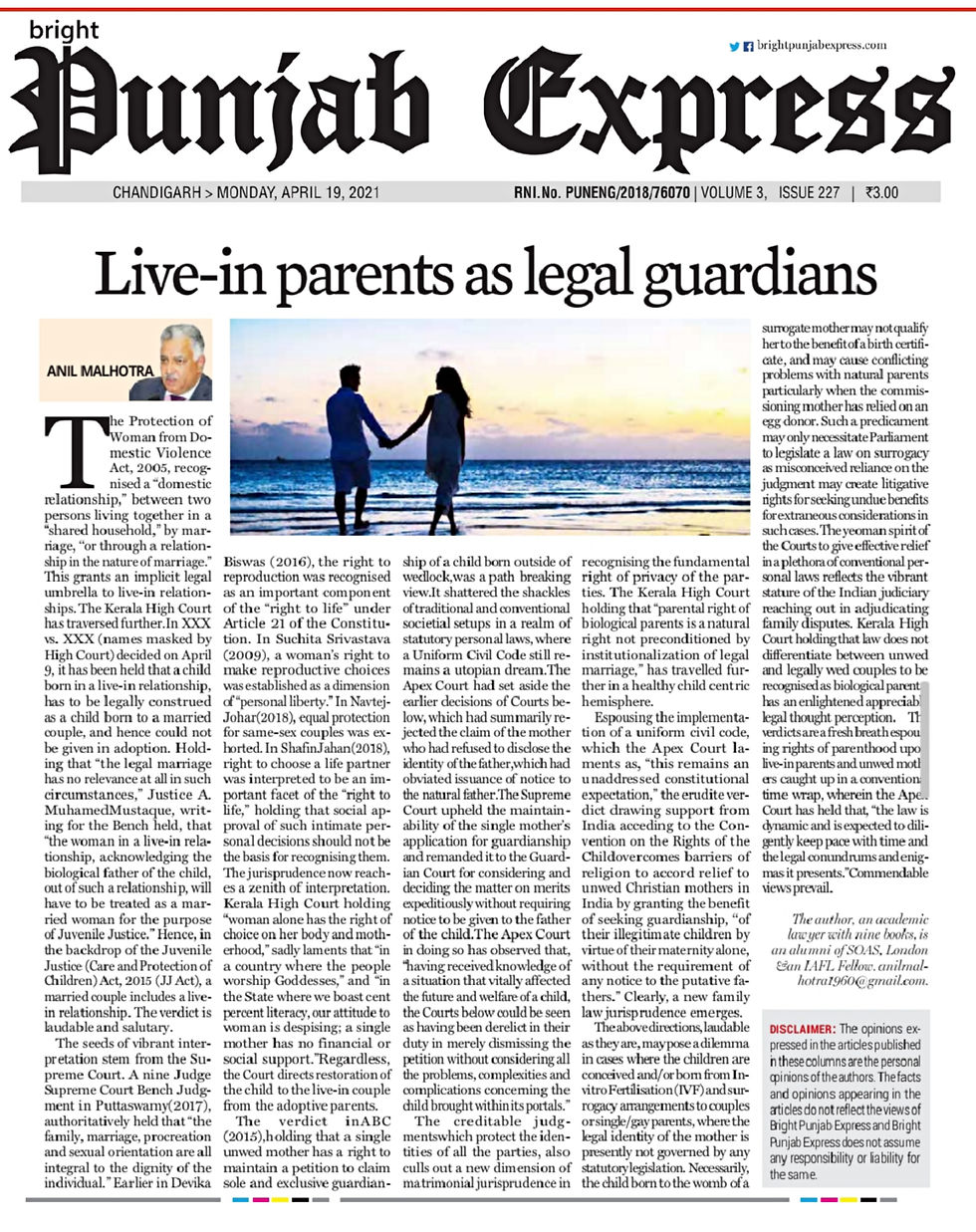Live-in parents as legal guardians
- anilmalhotra1960
- Jan 16, 2022
- 4 min read

This Article is authored by Advocate Anil Malhotra.
The Protection of Woman from Domestic Violence Act, 2005, recognised a “domestic relationship,” between two persons living together in a “shared household,” by marriage, “or through a relationship in the nature of marriage.” This grants an implicit legal umbrella to live-in relationships. The Kerala High Court has traversed further.In XXX vs. XXX (names masked by High Court) decided on April 9, it has been held that a child born in a live-in relationship, has to be legally construed as a child born to a married couple, and hence could not be given in adoption. Holding that “the legal marriage has no relevance at all in such circumstances,” Justice A. Muhamed Mustaque, writing for the Bench held, that “the woman in a live-in relationship, acknowledging the biological father of the child, out of such a relationship, will have to be treated as a married woman for the purpose of Juvenile Justice.” Hence, in the backdrop of the Juvenile Justice (Care and Protection of Children) Act, 2015 (JJ Act), a married couple includes a live-in relationship. The verdict is laudable and salutary.
The seeds of vibrant interpretation stem from the Supreme Court. A nine Judge Supreme Court Bench Judgment in Puttaswamy (2017),authoritatively held that “the family, marriage, procreation and sexual orientation are all integral to the dignity of the individual.” Earlier in Devika Biswas (2016), the right to reproduction was recognised as an important component of the “right to life” under Article 21 of the Constitution. In Suchita Srivastava (2009), a woman’s right to make reproductive choices was established as a dimension of “personal liberty.” In Navtej Johar(2018), equal protection for same-sex couples was exhorted. In Shafin Jahan (2018), right to choose a life partner was interpreted to be an important facet of the “right to life,” holding that social approval of such intimate personal decisions should not be the basis for recognising them. The jurisprudence now reaches a zenith of interpretation. Kerala High Court holding “woman alone has the right of choice on her body and motherhood,” sadly laments that “in a country where the people worship Goddesses,” and “in the State where we boast cent percent literacy, our attitude to woman is despising; a single mother has no financial or social support.”Regardless, the Court directs restoration of the child to the live-in couple from the adoptive parents.
The verdict in ABC (2015),holding that a single unwed mother has a right to maintain a petition to claim sole and exclusive guardianship of a child born outside of wedlock,was a path breaking view.It shattered the shackles of traditional and conventional societal setups in a realm of statutory personal laws, where a Uniform Civil Code still remains a utopian dream.The Apex Court had set aside the earlier decisions of Courts below, which had summarily rejected the claim of the mother who had refused to disclose the identity of the father,which had obviated issuance of notice to the natural father.The Supreme Court upheld the maintainability of the single mother’s application for guardianship and remanded it to the Guardian Court for considering and deciding the matter on merits expeditiously without requiring notice to be given to the father of the child.The Apex Court in doing so has observed that, “having received knowledge of a situation that vitally affected the future and welfare of a child, the Courts below could be seen as having been derelict in their duty in merely dismissing the petition without considering all the problems, complexities and complications concerning the child brought within its portals.”
The creditable judgments which protect the identities of all the parties, also culls out a new dimension of matrimonial jurisprudence in recognising the fundamental right of privacy of the parties. The Kerala High Court holding that “parental right of biological parents is a natural right not preconditioned by institutionalization of legal marriage,” has travelled further in a healthy child centric hemisphere.
Espousing the implementation of a uniform civil code, which the Apex Court laments as, “this remains an unaddressed constitutional expectation,” the erudite verdict drawing support from India acceding to the Convention on the Rights of the Child overcomes barriers of religion to accord relief to unwed Christian mothers in India by granting the benefit of seeking guardianship, “of their illegitimate children by virtue of their maternity alone, without the requirement of any notice to the putative fathers.” Clearly, a new family law jurisprudence emerges.
The above directions, laudable as they are, may pose a dilemma in cases where the children are conceived and/or born from In-vitro Fertilisation (IVF) and surrogacy arrangements to couples or single/gay parents, where the legal identity of the mother is presently not governed by any statutory legislation. Necessarily, the child born to the womb of a surrogate mother may not qualify her to the benefit of a birth certificate, and may cause conflicting problems with natural parents particularly when the commissioning mother has relied on an egg donor. Such a predicament may only necessitate Parliament to legislate a law on surrogacy as misconceived reliance on the judgment may create litigative rights for seeking undue benefits for extraneous considerations in such cases. The yeoman spirit of the Courts to give effective relief in a plethora of conventional personal laws reflects the vibrant stature of the Indian judiciary reaching out in adjudicating family disputes. Kerala High Court holding that law does not differentiate between unwed and legally wed couples to be recognised as biological parents, has an enlightened appreciable legal thought perception. The verdicts are a fresh breath espousing rights of parenthood upon live-in parents and unwed mothers caught up in a conventional time wrap, wherein the Apex Court has held that, “the law is dynamic and is expected to diligently keep pace with time and the legal conundrums and enigmas it presents.”Commendable views prevail.
Comments